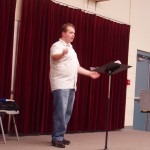“There’s nothing like music to relieve the soul and uplift it”
-Mickey Hart, percussionist for Grateful Dead
My Educational Philosophy
In entering into music education, students are learning, and being engaged in so much more than simply learning notes on a page. While students will gain the ability to perform either vocally or instrumentally at performable level, the learning does not stop there.
What students entering into music education are truly receiving is education in life. Students are being taught life skills through music. There are so many more levels that a music teacher can reach a student that cannot be attained by a Math, Science, or English teacher. Music is something that is always there. There is no way around it. By entering into music education, by learning how to sing, compose, or play an instrument, a student is becoming engaged in a whole new realm. They are finding a new outlet at which to express themselves.
There are aspects learned in music classes that translate to many other academic classes as well. Through the art of counting notes and learning the duration of beats and rests, students are gaining competency in math. Through learning the origins of a piece, who wrote it, where it came from, and how best to perform it, students are gaining competence in history. Through learning new definitions or words that tell students to change volume, tempo, or mood in a song, students are gaining competency in English, among other languages. The skills gained in a music class are cross curricular, and therefor, strengthens the statement that students are gaining life skills through music.
Another aspect of music that makes it unlike any other subject is the amount of emotion involved. Music has the ability to reach down deep inside us. It sooths us, it troubles us, it inspires us, it comforts us. Music is a part of our day to day lives, even if we do not take the time to realize it. Music has the ability to ignite our imaginations. In some, it instills colours or pictures into the mind. For others, it ignites fuel for further music creation. In engaging in music education, students are offering themselves to contribute to this level of creativity. Students will be forced to reach deep down into their emotions, and express themselves in ways they may never have ever thought possible.
Music classes are the ones that students will carry with them for the rest of their lives. They will build close friendships with their music classmates as they learn to work and create together. They will create memories and build strong skills socially and academically. Years after they complete their secondary education, students will often recall memories of the amazing music tours they went on, and think about the many nights spent performing for their parents and peers. Even if students choose not to study music after high school graduation, the skills, friendships, and memories that they will develop through taking music courses will live on in them for the rest of their lives, in way that they may not be able to comprehend. Music truly is life. Through the study of music, students will learn this first hand.
Other Contributions
During the course of my practicum and my Community Field Experience, I gained many new skills. One of the ones I am most proud of is a unit I devised in teaching note names to my students. It was a unit that consisted of 10 worksheets, 3 reference sheets (given out at various points during the unit), and a timed test at the end. What I discovered was that by the end of the unit, the students had gained a larger ability to name their notes. For reference, I have included the file here in pdf form. Also, for further reference, I have included a couple of lesson plans I used during the course of my practicum.
